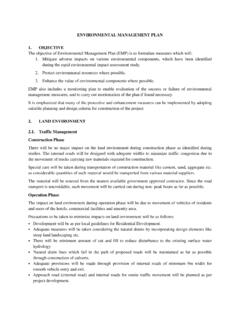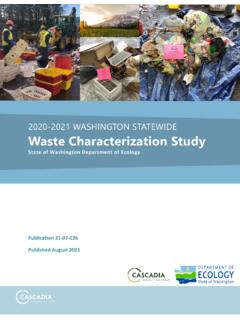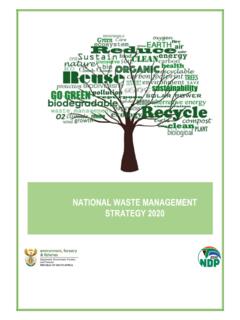Transcription of Starting a School Recycling Program - The Green Team
1 Starting a School Recycling Starting a School Recycling Starting a School Recycling Starting a School Recycling ProgramProgramProgramProgram Prepared by THE Green TEAM Massachusetts Department of Environmental Protection (MassDEP) One Winter Street Boston, MA 02108 2 Starting a School Recycling Program Introduction If you are interested in Starting a Recycling Program at your School and you have this toolkit in your hands, you are in luck! This guide will provide you with the basic framework for Starting a successful Recycling Program at your School , from planning, identifying, and implementing a Program that fits your needs, to monitoring and promoting your hard work. For additional information, see the Manual for Implementing School Recycling Programs. There are many benefits associated with establishing a Recycling Program at your School . Recycling is a great educational opportunity, engaging students in a sustainable behavior that they can take with them outside of the classroom.
2 Recycling saves natural resources and energy by reducing the need to use raw materials to make new products. Recycling extends the life of landfills by sending material to different processing facilities. And Recycling is usually less expensive than disposal and can sometimes even bring revenue to your School . To Start a Recycling Program at Your School : 1. Build support for the Recycling Program 2. Evaluate current waste operations and options for the Recycling Program 3. plan the Recycling Program 4. Implement the Recycling Program 5. Analyze and maintain the Recycling Program 6. Promote the Recycling Program 1. Build Support for the Recycling Program Identify a Recycling Coordinator for the School Program To make your School Recycling Program most successful, a Recycling Coordinator should be identified. This person will oversee and facilitate the Recycling Program , from planning and implementation to monitoring and promotion.
3 It is important to note that this person does not have to be the one to carry out all of the actions outlined in this guide, but should serve as the point of contact and organizer in charge of arranging that all action steps are taken. The Recycling Coordinator will be the driver of the Recycling initiative, championing its benefits and ensuring the Program is developed effectively. Suggestions for a Recycling Coordinator include: a School administrator; a School staff member, like a teacher, facilities/custodial staff or librarian; an active PTA member; or a local municipal Recycling coordinator. It is worth mentioning that successful programs have been implemented where a student took on the role of the Recycling Coordinator. If a student is identified as the Recycling Coordinator for your School s Recycling Program , then it is essential to take appropriate steps to ensure the Program remains sustainable after the student has moved on from your School .
4 3 Build Administrative and Staff Support Before a Recycling Program can be developed and implemented at your School , buy-in must occur at the top level of administrators and staff. Depending on who the person is at your School that is driving the effort to establish a Recycling Program , it may be the responsibility of the Recycling Coordinator to obtain approval and support from stakeholders. At this point, it is a good idea to know if the Recycling Program will be implemented district-wide, or just at your School . This decision will likely depend on the resources available for your Recycling Program , but some advantages to implementing the Recycling Program district-wide include: Recycling Program will be the same at every School , making it easier for student transition o Collection bins, materials collected, How-To s of participation Implementing the Program district-wide makes it difficult for a single School to choose not to participate Your Recycling hauler may offer a better service fee if the Program is implemented at every School in the district, especially if your trash hauler is also your Recycling hauler Stakeholders that should be in support of the Recycling Program include: School administrators (when implementing the Program district wide, this may include the Superintendent or representatives of the School Board.)
5 When implementing the Program at one School , this may just be the School Principal); the manager of the custodial or facilities staff; and representatives of the teaching staff (See Tip for Building Administrative and Staff Support , Supplemental Information). Massachusetts Department of Environmental Protection (MassDEP) offers a technical assistance grant to help School districts with their Recycling programs. The deadline for application is in mid-June. It is important to mention that for your School to be eligible for grant assistance from the MassDEP to implement School Recycling , your School district MUST adopt a district-wide School recyclable materials policy that explicitly states your School district s plans to recycle paper, cardboard, bottles and cans. If you plan on applying for grant assistance, your recyclable materials policy should be drafted, agreed upon, and adopted during the process of seeking approval for your Recycling Program (See Example Recyclable Materials Policy , Supplemental Information).
6 Form a Recycling Team Once a Recycling Coordinator has been identified and the Recycling Program has received support from necessary stakeholders, the next step is to form a Recycling Team. Suggested stakeholders for the team include: a representative from School administration; a representative from the custodial/facilities department; School faculty member (preferably a teacher); cafeteria monitor, a representative from your School s 4 Green TEAM; and an active PTA member. In addition, it is a good idea to include a student representative(s) on the Recycling Team. It is important to be inclusive when forming the Recycling Team both to prevent conflict, and build ownership through shared responsibility. The responsibility of forming the Recycling Team will likely fall to the Recycling Coordinator. That being said, by forming a comprehensive Recycling Team at the beginning of the process, the Recycling Coordinator will be reducing the amount of work that falls on them further down the line.
7 2. Evaluate Current waste Operations and Options for the Recycling Program Assess Current waste Operations It is essential to understand your School s existing waste operations and the quantity and type of waste your School generates in order to implement a Recycling Program . The custodial/facilities manager and members of their staff can provide key information of how waste moves through your School , and what materials make up that waste . Another source of this information is your School s existing waste hauler. It is important to identify if the hauler is contracted through the municipality, School district, or individual School and work with the contract manager to determine some information before calling. Does the School s current trash hauler charge a volume-based fee for service, a per ton fee, or a service frequency charge? Cost savings can be seen by reducing tonnage, volume, and service frequency.
8 What is the current amount of trash that is collected on a weekly basis from your School ? Ask for authorization to contact the hauler and then the waste hauler account representative s contact information. When talking with your School s hauler about establishing a Recycling Program , be sure to ask the following questions: Does the hauler have an estimate for how much of the trash is recyclable? If not, does the hauler offer a service to conduct onsite waste audits to identify quantity and type of waste generated at your School ? Does the hauler offer collection of recyclable material? If so, inquire: o What materials does the hauler collect? (NOTE: MassDEP waste Ban Regulations restrict certain readily recyclable or toxic items from being disposed of as trash including: cardboard, recyclable paper, bottles and cans.) o Is the Recycling service a single stream or a dual stream collection?
9 (See Single Stream vs. Dual Stream , Supplemental Information) o How must materials be prepared for collection? o What is the process for adding Recycling service to your School s existing waste hauling contract? 5 Tip: This is an opportunity for the contract manager to talk with your hauler about a favorable contract renegotiation If the hauler does not offer collection of recyclables, is the hauler aware of any services in your region that do offer collection of recyclables? (NOTE: RecyclingWorks in Massachusetts provides a searchable database to find local Recycling haulers and processors in your area: Call 1-888-254-5525 or visit ) The Recycling Coordinator will likely be the point person in charge of reaching out to your School s existing waste hauler. Depending on how successful that correspondence is, the Recycling Coordinator can work with the Recycling Team to ensure the following tasks get accomplished.
10 A waste audit is conducted to identify quantity and type of recyclable material generated at your School o For information on how to conduct a waste audit, see the Trash Can Scan activity on page 45 of the MassDEP s Solid waste Management Resource Guide for Massachusetts Schools A list of recyclables that can be locally and reliably processed in your School s region is created A Recycling service provider is identified that accepts recyclables that can be locally and reliably processed in your School s region The type of collection system ( single stream or dual stream) available in your region is identified Based on the results of this process, the Recycling Coordinator and Recycling Team should identify what materials the School s Recycling Program will target, whether the School s Program will be single stream or dual stream, and who the School s Recycling service provider will be.








